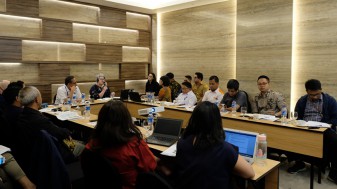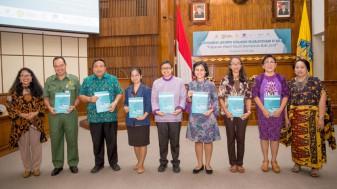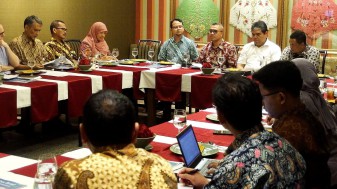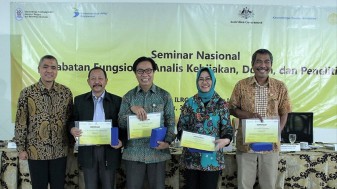Policy formulation to deal with a pandemic effectively requires adequate data support. For this reason, a data ecosystem with rich data sources needs to be developed so that its management can be maximized in order to formulate evidence-based policies.
That is one of the conclusions during KSIxChange#27, an online discussion event held by the Knowledge Sector Initiative (KSI) on Thursday (27/8). The discussion with the theme “Data-Based Decision Making in the Response to COVID-19” was opened by the Chargé d'Affaires of the Australian Embassy to Indonesia Allaster Cox. Speakers for this discussion included Head of Pulse Lab Jakarta Petrarca Karetji, Deputy for Population and Manpower of the Ministry of National Development Planning/Bappenas Pungky Sumadi, Acting Chief Scientist of Commonwealth Scientific and Industrial Research Organization (CSIRO) Cecile Paris, Executive Director of the Center for Strategic & International Studies (CSIS) Philips J Vermonte, as well as the Deputy for Social Sciences and Humanities (IPSK) of the Indonesian Institute of Sciences (LIPI) Tri Nuke Pudjiastuti. Jana Hertz as the Knowledge Sector Initiative Team Leader was the moderator in the discussion which was broadcasted live on the Asumsi.co Youtube channel.
Petrarca Karetji said, during a pandemic, innovation in data sources and data ecosystems is very important. This is because the scale of the impact of a pandemic is very different from other disasters. The world has been pushing for data driven initiatives. Regarding the COVID-19 data ecosystem in Indonesia, Pulse Lab Jakarta sees that an increase in the data infrastructure that underlies the data ecosystem is urgently needed. A rich and integrated data ecosystem will help to make decisions more responsive. The rich data ecosystem must be developed as it will not happen by itself.
The development of COVID-19 cases has been reported openly by the government in various districts and provinces, although not yet comprehensive. From May 2020 to the present, only 20 out of 34 provinces have special channels to report case developments. In addition, only 290 out of 523 districts have their website content updated regularly.
According to Petra, to be able to produce data-supported decisions requires the development of a data ecosystem. Data standards are important. COVID-19 is a momentum to improve the data ecosystem in Indonesia by maximizing the use of conventional and non-conventional data, as well as coordination and collaboration between stakeholders. "If the data ecosystem is strong, it will produce a much more adequate data analysis process to support local government decisions. "Data driven decision making will run smoothly if the data ecosystem is good," he added.
Pungky Sumadi explained, since the end of 2019 Bappenas has been tasked with overseeing and building a one data ecosystem. For poverty data, for example, the objective is to compile data that is disaggregated so that it can be used and trusted by various parties. In handling COVID-19, there are a number of social protection programs launched by the government that targeting the poor. Since 2015, the poverty data has been submitted to the Ministry of Social Affairs. However, there was a problem with the data update. Of the approximately 514 districts, only about 10 percent have improved their data. As a result, the poverty data accuracy rate is only 45 percent. With this level of accuracy, the distribution of social assistance during a pandemic becomes problematic. "This data is not accurate enough for us to use, even though this poverty data covers the lowest 40 percent of the population. We are also starting to provide assistance to workers who have been laid off. They are not among the 40 percent, but are affected. That's why we need a database for that, "he explained.
Cecile Paris said there are four aspects that would maximize the use of big data to deal with the impact of COVID-19 in Indonesia, namely social media analysis, population movement modeling, agent-based modeling, and capacity mapping to adapt to a crisis. For social media analysis, people will spontaneously share anything on social media, including when they are sick, sneeze, and so on. Certain words shared on the Twitter application can be a way to identify COVID-19. The same thing has also been done to track flu cases. "If certain words are mentioned more often than usual, then something is not normal, it becomes the initial signal of something so that it can be used to predict where the hot spots are and so on," she explained.
Political Commitment
Philips Vermonte said that the availability of data and data-based policies really depends on the political commitment of policy makers. Even when the data has been explained clearly, there are many things that can be a challenge, such as electoral considerations, sectoral egos, difficult bureaucracy, and so on. "What we do at CSIS is political advocacy towards decision makers, because it's useless to have a lot of data but leaders have no interest in data," he said.
According to him, currently social media provides an opportunity to exert pressure on decision makers. Even so, traditional media, both print and electronic, are still important as well as play a role as an information clearing house. "We hope that all actors play a check and balance role. Data is one thing, sometimes it can be misleading, depending on the integrity of the data generating institution, "he said.
Tri Nuke said, LIPI was involved in a social panel containing interested parties to collaborate with the task force for handling COVID-19. Early in the pandemic, initial data was limited. Researchers also seek to produce knowledge in limited situations by inviting policymakers to find out what is needed and conducting a number of surveys both online and via telephone. "Alternative data from big data can become basic data, but it still needs to be cleaned and reviewed whether it is valid and scientific as data for policy input, otherwise it is very dangerous," he said.
From that process, she saw that the researchers had not yet fully mastered the ability to mine data from big data. For this reason, the capacity of researchers needs to be improved both in exploring and processing conventional and alternative data. “Social science needs both skills. With those skills, all the scattered data can be use by all parties. Regardless of the accuracy, it is important to know on how to make good use of the data, "he added.
Closing this interactive discussion, Allaster Cox as Charge D'Affaires of the Australian Embassy in Jakarta, emphasized the importance of an innovative and integrated data ecosystem that is not only in the context of handling COVID-19 but also to address the challenges of resource scarcity caused by climate change and world population growth that continues to increase. "To make decisions in the next 30 years, without data we will face even greater difficulties," he said.
KSIxChange is an interactive discussion initiated by the Knowledge Sector Initiative (KSI), a partnership between the Indonesian and Australian governments with funding from the Australian Department of Foreign Affairs and Trade (DFAT). KSIxChange which is held at least once a month aims to support the implementation of government programs through increasing public discourse based on the use of evidence in the policy-making process. The KSIxChange#27 discussion has brought together policy makers, development partners and policy research institutes consisting of Bappenas, the Australian Embassy, the Jakarta Pulse Lab, CSIS, CSIRO, and LIPI to discuss how vital rich data and scientific information in a pandemic situation is for evidence-based policy making. Without good data and information, it will be difficult for us to overcome the COVID-19 pandemic.





